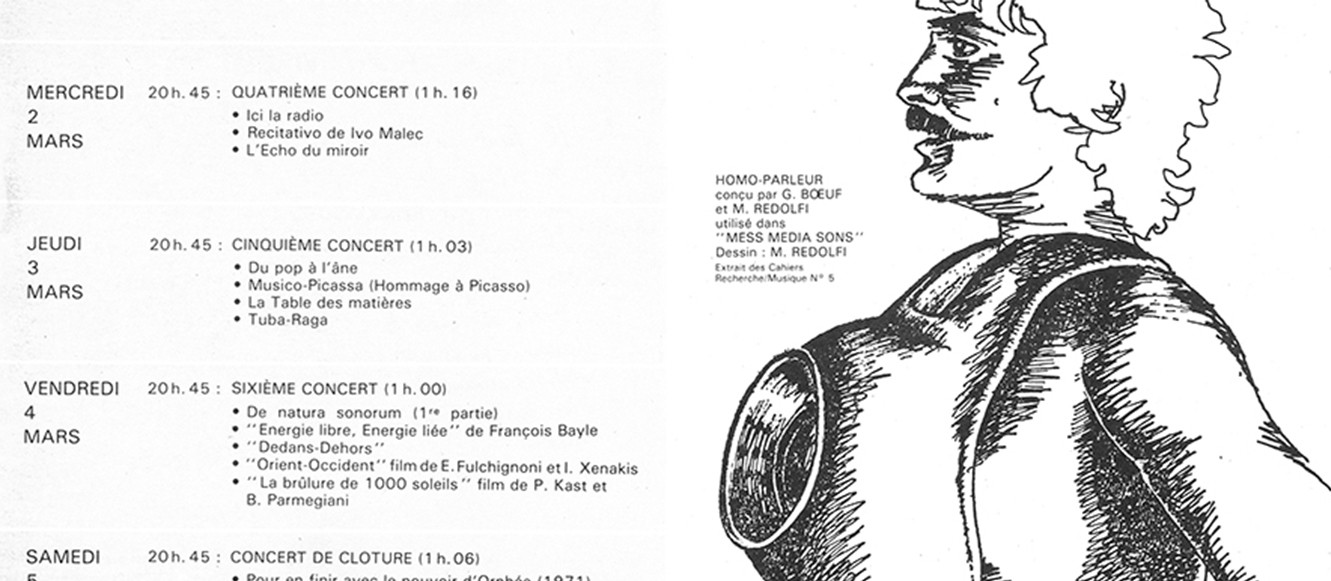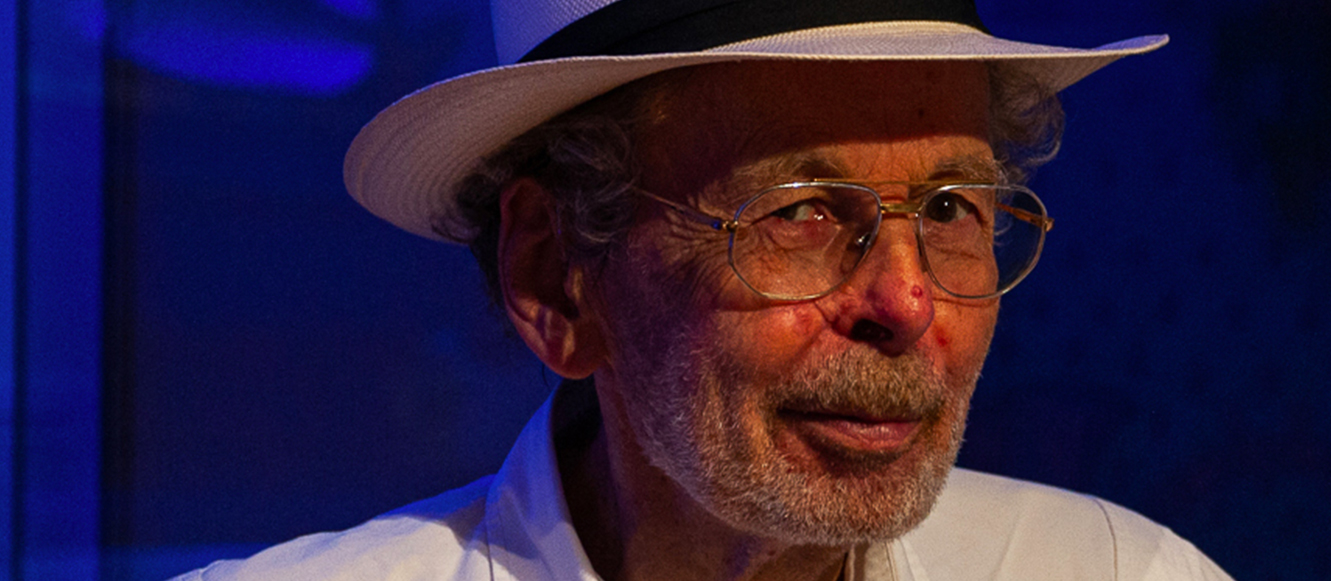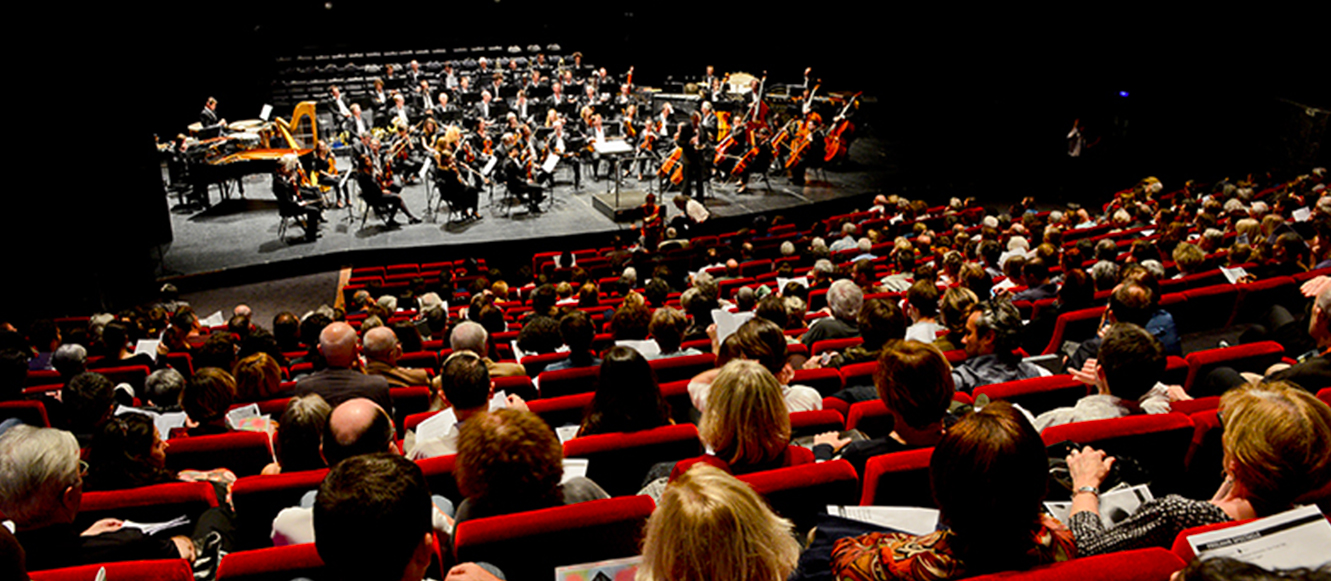This event, which has taken place every year in the spring from 1987 to 2019 in numerous heritage and cultural venues in the city, has always had the same objective: to provide a time and space dedicated to the creation and dissemination of music. The most important trends of the 20th and 21st centuries have been represented. The eclecticism of today's musical forms has opened up a field of adventure that the festival's programming has invested and developed each year, with some twenty events. The convergence of the arts and technological innovations has given rise to the production of multimedia performances of dance, theater, plastic and audiovisual installations, and films. The festival also presented the culmination of the Center's work (artist residencies, commissioned works, computer research and development).
The Festival Les Musiques has become the unmissable springtime event for musical and sound creation in Marseille and the region. For more than 30 years, it has opened up even more to musical aesthetics. Much more than a festival of contemporary music, it has become a festival of sound art where contemporary instrumental music, improvised music, sound art, musical theater, shows, performances, meetings... are mixed together, with local, national and international creation as the fundamental axis! Proposals during the day, in the evening, indoors and outdoors, for all audiences.
Since 2021, the Propagations festival has taken over...
History
The Festival Les Musiques, International Festival of Music of Today, was created in 1987 by Raphaël de Vivo with a group of composers consisting of Georges Boeuf, Lucien Bertolina, Jacques Diennet and Patrick Portella.
1987 - During four evenings, from June 21 to 27, works for magnetic tape, radio, electroacoustic, piano and computer-generated sounds were performed at the Théâtre National de Marseille - La Criée and at the Jardin des Vestiges du Centre Bourse.
Other editions followed, always at La Criée...
1988 - From April 14 to 16, the festival is oriented around the theme "the quietude of detour" in the presence of Christian Zanesi.
1989 - From May 18 to 20, the festival presents a program around Georges Bœuf.
1990 - On May 17, 18 and 19, the festival welcomes Eliane Radigue.
1991 - May 3 and 4, pay tribute to Morton Feldman, who died in 1987.
1992 - On January 16, 17 and 18, exceptionally during this period, Jean Barraqué, serial musician, is honored.
1993 - From May 5 to 8, the program revolves around Mauricio Kagel and John Cage.
1994 - From May 2 to 7, the festival is the occasion to celebrate the 25th anniversary of the Groupe de Musique Expérimental de Marseille (GMEM).
On the program: works by Jean-Claude Risset, Christian Calon, Pierre Boulez. It takes place at the Palais Longchamp, at La Criée, at the Cité de la Musique.
1995 - From April 8 to 22, the festival presents the composers Franco Donatoni, Ulrich Krieger, Reinhold Friedl, John Cage, Karlheinz Stockhausen, Peter Sinclair... It takes place in 9 places including a big top.
1996 - From April 23 to May 4, the Musicatreize ensembles, the Percussions de Strasbourg, the Orchestre régional de Cannes and Télémaque play works by composers such as Heiner Goebbels, Igor Stravinski and Mauricio Kagel.
1997 - the GMEM is labeled National Center for Musical Creation (CNCM).
From April 1 to 12, the festival is extended in duration, number of concerts and venues. It will take place at La Criée, the Musée des Beaux-Arts, the Faculté des Lettres d'Aix-en-Provence, the Cité de la Musique, the Musée Cantini, the Cinéma Le Breteuil, the Église de la Trinité and the Friche La Belle de Mai. Arnold Schoenberg's Pierrot Lunaire is proposed as an opening. It is also the arrival of peripheral events such as a workshop on today's musical languages.
1998 - From April 2 to 11, two portraits of composers Pascal Dusapin and Helmut Lachenmann are honored. It is also the occasion to celebrate the 50th anniversary of Musique Concrète, and to organize a seminar on musical creation in the PACA region with the DRAC.
1999 - From April 29 to May 12, the festival welcomes two courses of Georges Aperghis and Salvatore Sciarrino and celebrates the 30th anniversary of the GMEM. It takes place in 14 venues including the Marseille Opera, several churches and the esplanade of the Château Borely.
2000 - From May 18 to 27, the festival tries to distinguish between a certain conception of creation and diffusion of music, going from the 50s to the beginning of the 90s. Maurice Ohana, Pascal Dusapin, George Crumb, for the composers and Georges Appaix and Michel Kelemenis for the choreographers are honored... An exhibition and cinema, a symposium on the theme "Music and Representations" complete this artistic journey in 11 places.
2001 - From May 10 to 19, with a course around Luc Ferrari, a filmed presence of Anne Teresa de Keersmaeker, the invitation to the ensembles Ictus, Musicatreize, Télémaque (...) the edition leaves a place for dance and musical theater.
2002 - From May 22 to June 1, the proposed theme is "Pulsion / Impulsion" during a portrait dedicated to Tristan Murail. Works by Salvatore Sciarrino, Pascal Dusapin, György Ligeti, Luciano Berio, Régis Campo, Oscar Pizzo are performed by the Diotima Quartet, the Court-Circuit Ensemble, Garth Knox (...) in 11 venues.
2003 - From May 7 to 18, the staging, the scenography and the choreography of the music are at the center of the program. For the composers, Iannis Xenakis, Kasper Toeplitz, Ivo Malec, Kaija Saariaho... And the performers, the Nouvel Ensemble Moderne de Montréal, the Ars Nova ensemble, Eryck Abecassis... A workshop on contemporary music and the different currents that make it up, is led by different composers.
2004 - From May 7 to 16, the festival proposes a cycle dedicated to strings and quartet. The ensembles Debussy, Diotima and Parisii offer the works of 11 composers in the same evening. The ensemble TM+ honors Bernard Cavanna. The Percussions de Strasbourg perform Edgar Varèse. The festival is tightened on 6 places.
2005 - From May 12 to 21, the festival will take place in 7 venues and will feature works by Fausto Romitelli, Giacinto Scelsi, Tristan Murail, Clara Maïda... with the ensembles Musiques Nouvelles, Chœur Contemporain, Musicatreize, Percussions Claviers de Lyon, Ensemble Orchestral Contemporain, the Prague Philharmonia... and for the dance, the choreographer Christian Rizzo
2006 - From May 12 to 20, the festival offers works by Nicolas Frize, Roland Auzet, Philippe Leroux... performed by the Nouvel Ensemble Moderne, Alexis Descharmes, the Ensemble Musicatreize, Donatienne Michel-Dansac... and the Cies Sasha Waltz and Meg Stuart dance on a work by the Zeitkratzer ensemble.
2007-From May 5 to 22, it is the occasion to celebrate the 20th anniversary of the festival and the 10th anniversary of the GMEM's labeling as a National Center for Musical Creation. The edition offers 28 events: a concert in the Rue Saint-Ferréol for 250 musicians offers a long wave of sound, a triptych by Georges Boeuf for 100 saxophonists, La Chute by Mauricio Kagel, an evening devoted to percussion (including the Balinese Gamelan)... For dance, shows choreographed by the Susan Buirge and Boris Charmatz Company.
2008 - From April 17 to 26, on the program : The composers, Bernard Cavanna, Olivier Messiaen, Pierre Boulez, Mauro Lanza... The performers, Les Percussions de Strasbourg, Ensemble Apostrophe du Philharmonique de Nice, Ensemble 2e2m, Chœur Contemporain... The choreographers, Johanne Saunier, Mathilde Monnier.
A new pricing policy has been put in place: a single rate of 5€ is proposed so that the question of cost is not a barrier to access to culture.
2009 - From May 6 to 26, the single rate is renewed. The opening of the festival takes place on the roof terrace of the Friche la Belle de Mai with a sound installation followed by a free concert of Balinese Gamelan on the Place Villeneuve de Bargemon. The invited choreographers are Carolyn Carlson, Michel Kelemenis, Olivia Grandville. And the composers Hugues Dufourt, Elliott Carter, Kaija Saariaho, Jonathan Harvey, Eryck Abecassis...
2010 - From April 17 to May 1, are invited: The choreographers: Nicole Mossoux, Thierry Thieu Niang, Stéphanie Auberville. The ensembles Musiques Nouvelles, the Psophos and Parisii quartets, L'Itinéraire, the vocal music ensemble Neue Vocalsolisten from Stuttgart... The performers Saori Furukawa, Sonia Wieder-Atherton, Claude Tchamitchian, Michel Portal... The composers Mauro Lanza, Ondrej Adamek, Andrea Liberovici, Zad Moultaka...
2011 - From May 4 to 14, it is the 1st edition of Christian Sebille, new director of the GMEM, edition however programmed by Raphaël de Vivo. The composers represented are Terry Riley, Charles Ives, Georges Aperghis, Iannis Xenakis... Arte offers its partnership in the screening of two films on György Ligeti and Steve Reich at the Friche La Belle de Mai, followed by a dancefloor of contemporary music, with a set of 2 Dj's. The festival will close with a work by Frank Zappa performed by the Orchestre régional de Cannes Provence-Alpes-Côte d'Azur.
2012 - From May 9 to 19, is the occasion of a cross-programming between Christian Sebille and Raphaël de Vivo around several axes: The centenary of Cage's birth is the opportunity for a choreography with Olivia Grandville with the ensemble ]h[iatus. The pluridisciplinarity, coupling music with dance, visual arts or video give rise to shows by Benjamin Dupé Fantôme, un léger roulement, and sur la peau tendue qu'est notre tympan, by Maud Le Pladec on the music of Fausto Romitelli with the ensemble hiatus... To close the festival at the Cabaret Aléatoire, Code Napoléon proposes an electro evening.
2013 - From April 3 to May 15, the festival is "bursting" to take advantage of the unmissable opportunity offered by the European capital, Marseille-Provence 2013.
Les Musiques 2013, is built around two programming periods. A preview at the Château d'If around an installation of which Christian Sebille is the composer. The Odyssey of Oscar Strasnoy with the Ensemble Musicatreize, L'Itinéraire, Proxima Centauri, the Contemporary Choir, the Philharmonic Choir... Oiseau-Tonnerre by Célia Houdart and Sébastien Roux, a diptych project consisting of an installation in the changing rooms of the former coal mine of Puits Yvon-Morandat in Gardanne, and a sound trail on the Sainte-Victoire mountain. A creation giving rise to the opera O Mensch by Pascal Dusapin on the poems of Friedrich Nietzsche. The creation of Siwa by Michel Kelemenis on the string quartet of Debussy and on a commission to Yves Chauris... The presence of the quartets Tana, Ictus ... An edition at the height of 2013.
2014 - From May 7 to 17, the festival offers a very special opening night, from 6:30 to 10:30 pm at the Friche La Belle de Mai articulated in four concerts: the first one on the Roof Terrace for Philippe Glass' Concerto grosso with the Regional Orchestra of Cannes PACA; the second one at the Grand Plateau with the Regional Orchestra Avignon Provence on a work by Bernard Cavanna, the third one around Hugues Dufourt and Tristan Murail, to finish with a fourth concert with Tiger by Philippe Schoeller. On May 8 it is "Borély Night" which unfolds its program from 5:30 to 9:30 pm, for a device open to the walk, surrounded in a forest of speakers. This is followed by a Sensitivexplosion performance during which dishes are cooked thanks to sound waves, and at the end of each of the three acts, a tasting is orchestrated in the room. Twin Paradox, a show by Mathilde Monnier with music by Luc Ferrari; a show inspired by the texts of Louis-Ferdinand Céline with music by Bernard Cavanna À l'agité du bocal with the Ars Nova ensemble composed of 18 musicians; an opera Noise / video Safety First by Eryck Abecassis; ... Vortex Temporum, a show choreographed by Anne Teresa de Keersmaeker with music by Gérard Grisey performed by the Ictus Ensemble, closes the festival.
2015 - From May 2 to 16, the opening of the festival is dazzling with a symphonic concert, created by Georges Boeuf, entitled Les Neiges Éblouies with Musicatreize, the Chœur Contemporain and the Orchestre Philharmonique de Marseille. It was also the beginning of a collaboration with Alessandro Bosetti who set to music the choreographed gesture of Georges Appaix for J'ai attendu que l'homme à la grue soit là ... Il se trouve que les oreilles n'ont pas de paupières by Benjamin Dupé with the Quatuor Tana, on Pascal Quignard's text La Haine de la musique by the actor Pierre Baux; Walden by Loïc Guénin by the ensemble C Barré, proposes an open air concert on the roof of the Cité Le Corbusier.
In Cassis en plein air at the Fondation Camargo, the Béla Quartet performs works by Alex Mincek, John Cage, Morton Feldman, Meredith Monk, Philip Glass; Speakers live electronic by Hervé Birolini is a concert of gestures and movements...
2016 - From May 14 to 22, it is also the year of merger with the GRIM - Groupe de Recherche et d'Improvisation Musicales and also of the creation of new premises for the GMEM at the Friche La Belle de Mai.
The festival consists of 37 events: Ondrej Adamek's Airmachine, an installation and performance at the same time, presenting an instrument made of a blower and multiple air outlets that sets in motion mother-in-law's tongues, plastic gloves and other wacky objects; the installation Le Stéréoscope des Solitaires forms a labyrinth where the audience wanders, with the KNM Ensemble; Serious Smile on the works of Henry Fourès, Javier Alvarez and Alexander Schubert, for instrumental ensemble and juggler with balls augmented with embedded motion sensors; Sans Nom Dit, a participatory project with 117 participants conceived by Christian Sebille is installed on the Grand Plateau of the Friche La Belle de Mai; Chant d'Hiver by Samuel Sighicelli on the original text by Tanguy Viel; Ply choreographed by Yuval Pick on the music of Ashley Fure; Extra Shapes on the music of Sebastien Roux, designed by DD Dorvilliers; ... And to close the festival, the ensembles 2E2M and Zeitkratzer interpret the works of Lou Reed.
2017 - From May 12 to 20, the Module's doors open to sound massages, installations, open rehearsals, tours, a continuous opening night from 5 to 11 pm; at La Criée, the Ensemble Orchestral Contemporain performs Songs of the Wars I Saw based on the book by Gertrude Stein; the Quatuor Diotima proposes a program of works by Mauro Lanza, Ashley Fure, Oscar Strasnoy, Philipp Maintz; the ensembles Itinéraire and Ice perform works by Gérard Grisey, Ashley Fure, Philippe Leroux and Christopher Trapani for Spectral Streams;... The Percussions de Strasbourg and ErikM close this edition for Drum-Machines...
2018 - From May 12 to 19, the festival starts with a meeting organized by the Association of National Centers of Musical Creation, to try to reflect on the impact that a creative activity can exert on territories; Papillon Noir is created on the texts of Yannick Haenel, on the music of Yann Robin with the instrumental ensembles Multilatérale and vocal Métaboles. In the open air, at the Camargo Foundation in Cassis, takes place Ici je n'ai pas vu de Papillon after the poems of the children of Terezin, conceived by the cellist Sonia Wieder-Atherton; Then, Sound Listening with the ensemble ICE; the concert of percussion and electronics Umwelt by Bertrand Wolff, by Damien Ravnich and François Rossi; Ioom + eddies choreographed by Yuval Pick to music by Nico Muhly and Samuel Sighicelli; the Éclat concert bringing together the ICE and C Barré ensembles with creations by Nathan Davis and Christopher Trapani and works by Pierre Boulez and Francesca Verunelli; Burning Bright by Hugues Dufourt with the Percussions de Strasbourg; ....and a closing in the stars in the open air on the Toit Terrasse of the Friche La Belle de Mai, during a monumental audiovisual installation where the artists Félicie d'Estienne d'Orves (visual artist) and Julie Rousse (composer) collaborate to write a visual and sound score, composing with the distances and specificities of a hundred celestial objects pointed by lasers...
2019 - From May 12 to 19, the program is impregnated with new forms of dissemination of creative music with, in particular, the programming of three sound installations accessible throughout the festival and free admission: Escale at Galeries Lafayette Marseille Prado presents pieces by composers from around the Mediterranean, La vie radieuse, a 3D sound installation by Elisa Portier and Pom Bouvier-b at the Unité d'Habitation Le Corbusier, and Le bord de la bande by Anne-Laure Pigache and Anne-Julie Rollet at the GMEM studios. Multidisciplinary, the festival is also marked by a music and dance program with Ersilia by Alvise Sinivia using the space of the Module of the GMEM in a circular device, Dance Concert by Ola Maciejevska, Palimpsteste, Solo/Duo by Michèle Noiret on a live piece by Stockhausen. This edition also welcomes the ensembles 2e2m, TM+, I.R.E, the Tana Quartet, the K/D/M Trio, the Avignon-Provence Regional Orchestra, and the composers Michaël Levinas, Alireza Farhang, Regis Campo, Mayu Hirano, Misato Mochizuki, Luis Naon, Nuria Gimenez-Comas, among others.
2020 - 33rd edition cancelled - Covid 19
The presidential announcement - specifying the legal framework of the ban on festivals by July 15 - forces us to cancel all the programming envisaged within the Festival Les Musiques. In consultation with the artistic teams and our partners, the performances are for the most part rescheduled from next September - within the Season or during the next edition of the Festival. This unusual period has been used to imagine new forms of relationships with artists, technicians, audiences, partners, amateurs and professionals.
2021 - The Propagations festival is created and replaces the Les Musiques festival.
It is created in a form open only to professionals because of Covid 19.
2022 - Propagations, 1st edition open to the public takes place from May 5th to 15th, with 18 events including 9 original creations.
Propagations is the festival of all creative music and all sound experiences.
Known or unheard of instruments, immersive diffusion devices, sound transformation, artistic multidisciplinarity combine and aggregate, during 10 days in Marseille and Aix-en-Provence.



